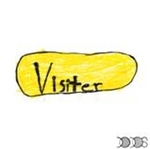
The Dodos
Visiter
(Frenchkiss; 2008)
By Colin McGowan | 17 April 2008
Remember when your mother or your minister or (insert lame authority figure here) were running down that whole “Shoot for the moon. Even if you miss…” spiel that at age seven was inspiring but by sixteen was outright depressing, a source of dissatisfaction with self that could only be numbed, ironically enough, by Painful (1993)? Well friend, San Francisco’s the Dodos can relate, and they have gathered those indie touchstones you’ve fawned over through the years and held an ambitious potluck of their (see: your) very own, boasting impressive results.
The whole big, fat, sprawling indie rock aesthetic has relied heavily on a slouched frame and a wink, self-deprecation and a smile; all of this is prevalent throughout the Dodos’ sophomore effort, but grander undertones are present beneath the bad haircuts and humility, as Meric Long and Logan Kroeber attempt to scale an indie Rushmore of influences, a formidable task that would seem to contradict the very indie ethos they wear so prominently on the sleeves of their plaid button-ups. And while Visiter clearly owes a debt to indie stalwarts Sam Beam and Animal Collective, to name a few from so many, it never feels like a watered down version of either of those acts, nor can it be characterized as unimaginative. Long and Kroeber are clearly aligning themselves with bands many of us know quite intimately and from there, from the inside, craft an incontestably unique affair. It’s this insular innocence that gives full lease to the band’s imagination.
A large part of Visiter‘s appeal, though, lies in the organic atmosphere it evokes. Long’s alternately frantic and deliberate acoustic guitar and Kroeber’s percussion, crisp and varied, render the songs in autumnal hues and a sun-blanketed warmth that amplifies the record’s sweetly romantic tone, glossing over the occasional lyrical mishap, a majority of which result from Long’s heavy-handedness with adolescent sentiment (“But I wouldn’t care if I was dead / If I had a chance to hold your hand”). The motorboat bass on “Red and Purple” joins an already fervent rhythm section with an amiable nature that propels the song into grin-inducing territory. And “Jodi,” ramshackle and stumbling, delights with schizoid drums and guitars morphing from the low end, all barely audible strumming to measured plucking, with Long alternating between desperate chants and mildly charming professions that trip over each other, falling on the floor in an exuberant heap of exhausted screams by the end.
Exemplified on both of these songs is Long’s uncanny ability to command attention. While comparisons can easily be drawn between Long and a handful of vocalists (Menomena’s Justin Harris comes to mind), embedded in his voice is a certain urgency that demands closer listening. As essential as Kroeber’s propulsive percussion is to Visiter‘s success, Long lends the album its personality, his warm, surprisingly versatile vocal chops escorting the listener through a surreal, bustling environment. At his very best, Long invokes memories of Malkmus circa Wowee Zowee (1995), spouting faintly poetic non-sequiturs with disarming ease, while at some points, namely the delicate but slightly agonizing “Undeclared,” he seems to attempt the channeling of another indie-famous Steve, Merritt this time, to a lesser effect, resulting in overworked attempts at profundity. Kudos go to Long for putting himself out there—he easily could have masked his still-developing songwriting skills by pushing his vocals back in the mix on the handful of songs on which his lyrics are so prominent, allowing his voice to blend into the consistently brilliant backdrops—but Visiter is a little worse off for such attempts at balladry, if only for the fact that the more cacophonous numbers are so arresting. “Walking” is the beautiful exception to this rule, its plush simplicity allowing Long to present the album’s most raw, purely emotive moment with the aid of additional vocals from Laura Gibson; it is both Long’s considerable potential as a songwriter (his word choices are markedly intriguing here) and the duo’s tremendous versatility from an instrumentally limited standpoint that are epitomized from the get-go.
Characterizing the Dodos as derivative feels like an unwarranted slight, but their ancestry is apparent and barking down the door, ready to tear this titularly extinct oddity to bits. In this respect, Visiter presents a resounding argument that a band most certainly can create an album of tremendous caliber by collecting an obvious set of influences, subtlely modifying lyrical approaches and juxtaposing familiar sounds. Of course, Lofty goals and obvious influences set Visiter up for failure; such arduous undertakings often result in unintelligible catastrophes or bland reproductions of the music from which they are siphoning ideas. But Long and Kroeber deserve sizable praise for avoiding the pitfalls of such practices, even with some inevitable shortcomings that are to be expected from a relatively young band with big aspirations: occasionally empty lyricism and a lack of brevity (60 minutes feels about ten minutes too long) hamper the collection, hardly marring a gem that could, in retrospect, be seen as a forbearer to even more fruitful efforts in the future.





